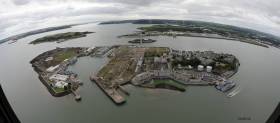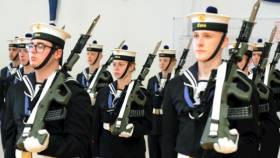Displaying items by tag: Recruits
Naval Service Class of Recruits All Leave For Private Sector as Retention Crisis Worsens
As The Irish Times reports an entire class of Naval Service apprentices is leaving at the same time after a private company bought out their contracts, a sign of the worsening retention crisis in the Defence Forces.
The five recruits were undergoing training as ships’ electricians, known in the Naval Service as electrical artificers. They recently completed their block release, the military version of work placement, with the multinational medical supply company Stryker in Cork.
It is understood Stryker was impressed with the apprentices’ work. It offered all of them permanent positions in the company and to buy out their military contracts. Two of the recruits have taken up the offer and the other three are in the process of leaving.
The cost of buying out the recruits’ contracts is estimated to be up to €30,000. Military sources said this figure pales in comparison to what it cost the Naval Service to train the recruits up to this point.
Just under 270 personnel have left the Defence Forces so far this year, almost three times the figure for the same period in 2021.
More from the newspaper here.
Defence Forces: Hundreds Of Recruits Paid to Leave Before Completing Training
The Irish Examiner writes, the number of recruits paying to get out of the Defence Forces before their training has even finished confirms claims the retention crisis can't be overcome by major recruitment drives alone.
Figures obtained by Jack Chambers, Fianna Fáil spokesman for Defence, show that 861 personnel paid to get out of the army, naval service and air corps from 2016 to 2018. Of those, 400 were recruits in training.
In total, all those getting their discharge papers over the three-year period had to pay the Department of Defence a combined €356,813.07 to leave.
Last year 113 recruits purchased their discharges out of a total of 611 recruited across the three branches of the Defence Forces.
A further 177 seasoned soldiers, sailors and aircrew opted to get out as well. The 290 in total who chose this path had to pay the Department of Defence €143,782.60 to quit.
Click this link for more on this story.
Naval Service Bonus As It Takes on More Foreign-Born Recruits
#navy - Increasingly the Naval Service is taking on more foreign-born recruits, which is a bonus when it comes to dealing with trawlers fishing off the coast that hail from a number of different countries.
As the Irish Eaminer writes, the latest foreign-born recruit to join up is Krzysztof Mendel, 18, who was born in Mragowo in Poland.
As a very young man he moved to Kilmacrenan, County Donegal and was inspired to join the military by his father who served in the Polish Army.
Krzysztof has joined the ranks which already feature a number of Poles and other Eastern Europeans.
A Naval Service spokesman said many of these recruits are fluent in several languages and this comes in very useful when they are on fishery patrols and have to communicate with foreign vessels.
More the story by clicking here.






























































